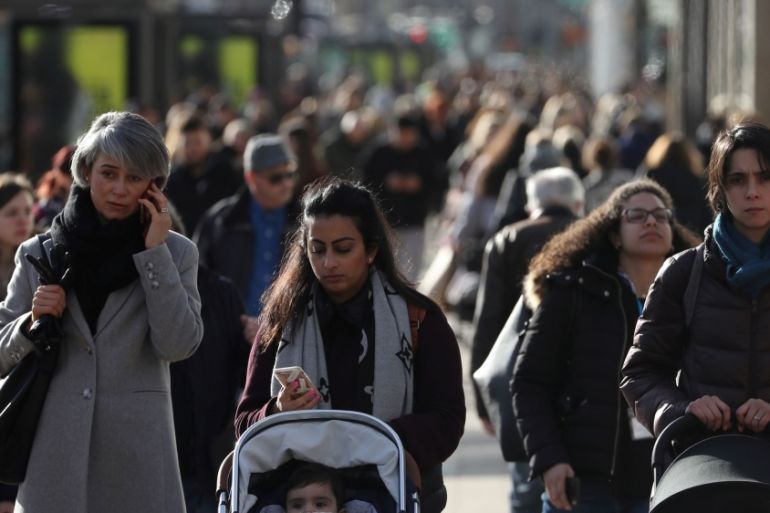This report confirms it: Almost everyone is biased against women
The UN says bias blocks women from accessing education, jobs and political power – and that is bad for everyone.

Inequality is an obstacle billions of women around the globe navigate at their peril every single day of their lives. Now, a new United Nations study sheds light on why at this stage of human civilisation, not a single country on the planet has yet achieved gender equity.
Turns out some 90 percent of people – a staggering nine out of 10 – are prejudiced against women in some way, according to the UN Development Programme (UNDP)’s Gender Norms Index.
Keep reading
list of 4 itemsPhotos: Bangladesh opens mosque for transgender hijra community
‘No women allowed’: The powerful membership of UK’s men-only Garrick Club
Goals not guns: How a girls football team in India’s Manipur beats violence
Gathering data from 75 countries, the analysis covers 80 percent of the global population and measures how social beliefs obstruct gender equity in areas like politics, work, and education, to the detriment of all of society.
Despite decades of progress in advancing women’s equality in many nations, the findings expose cultural attitudes that continue to act as stealth barriers to women achieving an equal footing with men.
More than half of men and women surveyed for example think men make better political leaders than women. Some 40 percent say men are better at business and more deserving of a job when work is scarce. More than a quarter – again men and women surveyed – think it is justified for a man to beat his wife.
On Sunday, International Women’s Day commemorates the 25th anniversary of the adoption of the Beijing Platform for Action, a landmark agreement promoting women’s rights, adopted by world leaders in China in 1995.
Since Beijing, progress has been achieved – there has been a substantial drop in maternal mortality rates and an increase in girls enrolled in primary schools.
But UNDP’s findings indicate there is significant social pushback, with negative attitudes towards gender equality actually growing in 31 countries.
“The glass ceiling for women is still hard to break,” Raquel Lagunas, UNDP’s top expert on gender, told Al Jazeera.
Bias bites
Bias is not just a bad attitude. It feeds economic inequality and poverty.
Every day, women and girls over the age of 15 put in 12.5 billion hours – or $10.8 trillion worth annually- of care work for free, according to non-profit Oxfam.
The richest 22 men in the world also own more wealth than all the women in Africa – some 325 million women – combined, says Oxfam.
“Women work more hours than men, but they do three times more unpaid care work; when they are paid, they earn less than men and they are less likely to be in management positions,” said Lagunas.
Educating people, changing mindsets and transforming workplaces, schools, and legal systems that continue to promote biases is essential to break them down, according to the UNDP. The agency advocates government-driven policies and programmes, such as paternity leave, quotas that promote women’s participation in politics, and encouraging women and girls, to enter traditionally male-dominated sectors like science and technology.
Woman vs woman
While 91 percent of men were found to have at least one bias against women, the UNDP index also found that 86 percent of women harbour the same prejudice.
Serena Fong, vice president at Catalyst, a nonprofit dedicated to advancing women’s progress in workplaces, was not surprised.
“Many of the biases can be unconscious, automatic or mental shortcuts,” Fong told Al Jazeera.
Unconscious bias can have tangible consequences. If a woman believes men make better politicians and leaders, she is likely to turn that belief into action at the ballot box – locking women out of decision-making roles.
“Women are socialised in the same way as men – in family, school, work – so they are susceptible to having the same biases and prejudices. They too can have beliefs that limit their economic and social potential,” said Lagunas.
This is reflected at the very pinnacle of political power. Despite women and men voting at similar rates, only 10 out of 193 governments worldwide are headed by women.
Abrasive or assertive?
Various movements are trying to redress the deeply rooted social biases that hold women back.
The #BiasCorrect campaign led by Catalyst, for example, draws attention to the power of words.
“Women and men with the same talents and skills are often described in very different ways,” said Fong. “For example, if a woman is described as ‘abrasive’, a man exhibiting the same behaviour might be called ‘assertive’.”
But some who have broken through the glass ceiling say the more women speak out against the unconscious biases they face, the easier it is for others to follow suit.
“I’ve called out the people who used gender bias against me but early on it was difficult feedback to hear and certainly put a label on my back,” said Cate Luzio, CEO of Luminary.
Joanne McKinney, the CEO of brands consultancy Burns Group, faced a similar problem: “I often felt that my ambition and confidence was seen as aggressive and pushy while the same behaviour was welcome with my male peers,” she told Al Jazeera.
McKinney recalled suffering for years from what many women endure: the so-called “imposter syndrome” or doubting one’s qualifications to lead, especially as her personal life evolved. “I felt expectations of me lowered by increments when I became a wife and then a mother,” she told Al Jazeera.
Opportunities came, she said, when she made herself indispensable and did not shy away from her accomplishments.
“Value yourself, keep track of your contributions – literally, keep a running list – and speak out about those achievements.”